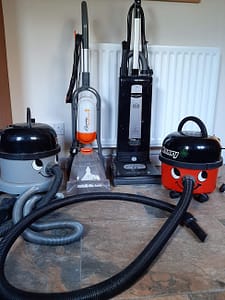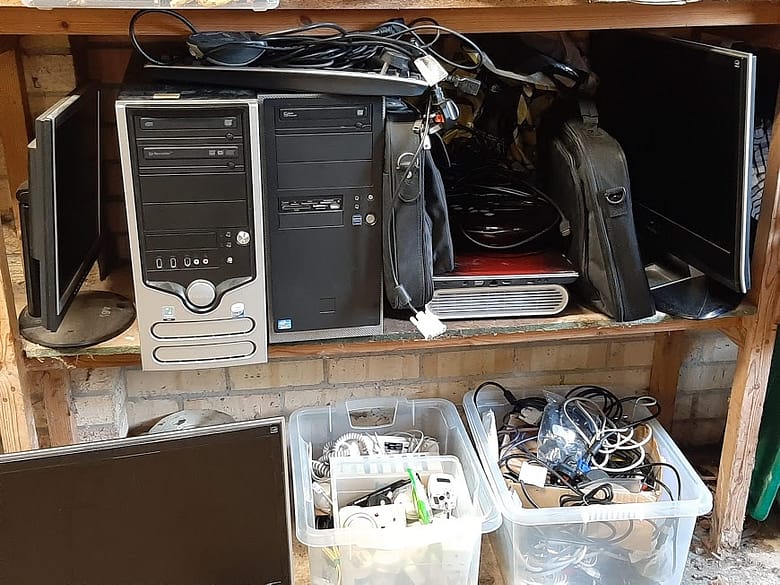Are you recycling your waste electrical and electronic equipment (WEEE) or are you, like me, guilty of putting it in a cupboard and forgetting about it?
Defra has set an overall collection target of 550,577 tonnes for 2019 – which is around 12% higher than the total amount of household WEEE collected and reported by compliance schemes in 2018.
‘Challenging’ 2019 WEEE targets confirmed. letsrecycle.com
When WEEE is taking up valuable space in our homes and garages why are householders like you and I not recycling more?
Electrical and Electronics Recycling at Home
After reading the report by REPIC Understanding WEEE and EEE flows to support implementation of policy objectives I decided to collect together all the WEEE around my house and in my garage and to recycle it as soon as possible.
I found
- 2 mobile phones
- 2 desktop computers
- 4 laptops
- chargers
- 1 keyboard
- 3 monitors
- other cables (function unknown to me)
- 3 hoovers – one which could be refurbished and two which are working.
- 1 carpet cleaner in need of maintenance
WEEE – phones – Concern about what happens to them.
At the time I put together this list I was just about to invest in a new phone so I was able to hand the two old phones to Vodafone. The sales consultant advised me to hold onto my outgoing phone ‘just in case’ I need information from it. So I now have a new old phone! Not so easy to get rid of.
The two original phones can be removed from the list above and then the new old phone needs to be added to the list.
What happens to our old phones when we recycle them?
‘There’s gold, platinum and other valuable materials in every phone – the hard part is getting it out.” (Your old phone is full of untapped precious metals, BBC Future Bianca Nogrady October 2016)
Smartphones contain gold, silver, palladium and platinum as well as aluminum and copper. They also contain rare earth elements, which are difficult to mine – including yttrium, lanthanum, terbium, neodymium, gadolinium and praseodymium. Then there is the glass, plastic and the battery. (Your old phone is full of untapped precious metals, BBC Future Bianca Nogrady October 2016)
Each individual phone contains miniscule amounts of valuable materials but when the quantities are added together collecting them is more attractive. However this is often done in places like China by poorly paid people and children eg in Guiyu, where the residents are experiencing health problems and the environment is being polluted. (Your old phone is full of untapped precious metals, BBC Future Bianca Nogrady October 2016)
Secondhand phones
Worried about what happens to old mobile phones I considered buying a Fairphone or a secondhand phone and visited a shop selling secondhand phones to ask how much technical support was available. I overheard a couple in the queue in front of me complaining that the phone they had bought was faulty. The staff insisted it was okay when it left the shop.
In the article Circular Consumer Electronics: An Initial Exploration – Ellen Macarthur Foundation the authors site “multiple factors deterring users from refurbished and used devices” including
- financial risk should an item malfunction
- inferior performance
- not being up to date with technology
- concerns about data safety
Little technical help was available to me. I was disappointed there was no way around buying a new phone for me.
Vodafone’s sales consultant pointed out that I had kept my current phone for as long as possible: I was its first, second and third user and I have maintained and prolonged the life of my phone as long as possible.
WEEE – Old Computers – Dexterity, Tools and Time
The reason we haven’t recycled the old computers is because they need to be wiped.
Wipe, in a computing context, means to render all data on the hard drive unreadable.
Mobile endpoint security: What enterprise infosec pros must know now – Margaret Rouse
We need to remove the hard drive and either take a hammer to it or drop it from a height or otherwise destroy it.
Some hard disks came out easily. For others we needed to follow instructions. You need a variety of tiny screw drivers and a little time. Many people may not have either the range of screwdrivers or the time.
Who will take your old computers?
I’ve found a charity called Charity Lifeline that will take old monitors and computers and sell them on. They will collect if you have enough to make a journey worthwhile. I have some other non WEEE items (furniture) which may be of use to them.
According to their website Curry’s will take them and offer a data wiping service although I have not tried it.
Wastezon is an app which puts companies in touch with householders so that they can dispose of their household waste.
In future I will make sure that the company who supplies the new computer removes the hard drive from the old computer and that they take the old computer away. In my experience it is difficult to find someone to help you do this at any other time. It is important to make sure other members of the household do the same. My partner tells me he has been advised to hold onto the old computers at work ‘just in case they need any more information from them’. Maybe one has to give away the last computer but one.
WEEE – Other electrical equipment – ‘Just in case’
…research from the Association of Manufacturers of Domestic Appliances (AMDEA) has shown that some households have 4 or more refridgeration appliances and evidence suggests that retaining multiple products – or even hoarding them is on the rise.
Understanding WEEE and EEE flows to support implementation of policy objectives. REPIC
Hoovers
I’ve discovered I own 4 hoovers! And I am not very enthusiastic about hoovering. One was for business use. The others I kept replacing in the vain hope of making the job of hoovering easier. I have three dogs and with each dog the dust and pet hair increases proportionally. I am increasingly concerned about getting on top of the dust in the house because this is one of the places toxic chemicals in the homes collects (See my article Chemicals in our homes).

- a cylinder type is missing a front wheel, the nozzle on the hose has split and the filter is dirty and needs to be replaced. All the new parts are available on Amazon.
- one a cylinder type, which I found unwieldy. It kept tipping over and wasn’t any good at picking up the pet hair.
- an upright vacuum cleaner, effective but heavy. I was holding on to this one because ‘just in case’ the hand held device broke down.
- a lighter handheld device – currently in use.
Some unwanted but working products are being recycled as WEEE but many are being retained by households ‘just in case’ of secondary use.
Understanding WEEE and EEE flows to support implementation of policy objectives. REPIC
Carpet Cleaner
I also own a carpet cleaner which I haven’t used for some time. It was blocked and easily unblocked with a solution of water and vinegar.
I rang the company that sold me the carpet cleaner to me. They said “they are more trouble than they are worth” and suggested recycling it . I pointed out that I had bought the machine from them! Nevertheless they still recommended that if I needed my carpets needed cleaning I (a) hire a machine or (b) pay a company to do it.
Many of us throw away items that with a small repair may be functional: a friend of mine admitted that he and his wife had almost done just that with a tumble dryer. A switch had tripped. He removed a panel from the back to get to the switch. The task was fiddly even for a carpenter. Many other people may not have the tools or skills to get the panel off. Maybe manufacturers could make it easier. Lack of skills and tools may be holding us back
Give to charity
Once I have cleaned the hoovers up myself I will keep a couple and give the rest to Open Door or Emmaus where they can PAT test them and sell them to someone who needs them.
WEEE Recycling – More money can be made from new sales
I have tried to get vacuum cleaners serviced in the past, but the cost of so doing makes purchasing a new one look like the better option particularly when you are faced with a seasoned salesman who stands to make more on the margin for new goods than on repairing the old one.
WEEE Recycling – Reverse Logistics – The Cost of Return
Reverse logistics – Flow of surplus unwanted material goods, or equipment back to the firm, through its logistics chain.
Business Dictionary
Before reading REPICS article I had started to recycle the WEEE around the house. I sent 3 old routers back to TalkTalk. They supplied a prepaid envelope. I felt much happier doing this than taking the equipment to the recycling centre. So perhaps householders need to be more confident about what happens to WEEE after they drop it at the recycling centre.
I also returned an old electric toothbrush to its manufacturer. The manufacturer supplied a Freepost address.
Sky offer the same service. Their website says they can reuse most parts of your old products, and any they can’t reuse, they will recycle.
Who pays postage may be holding people back too?
Is it more costly to the environment to return it at all?
WEEE Recycling – Who nets the value?
Even what we paid for an item might be influencing how and whether we recycle an item. If we paid a lot of money for something it might be difficult to view that item as older technology and therefore waste.
WEEE Recycling – When is it better to buy new?
It may on occasion be better to buy a new and more efficient appliance than to keep fixing the old one and then to free up the materials and feed them back into to the system.
WEEE – In summary
Is it really easier to chuck away an appliance rather than spend a few minutes reading the manual, usually available on the internet and adjusting or maintaining a machine than it is to earn the money too buy a new appliance.
In the old days people did not have the money to just buy a new appliance. A friend of mine told me her parents repaired everything themselves – even their cars.
Surely it is time for householders to clear out their cupboards and get those resources back into the economy.
Every household has over 80 items that are being used less than 10 times per year. Just imagine what this could mean for the circular economy.”
Circular Belgium
Some reasons why households don’t recycle WEEE
- concerns about what happens to WEEE and whether or not it ends up in the environment
- concern about the true value and who gets that value
- holding on to an appliance ‘just in case’
- lack of skills
- lack of tools
- lack of time
